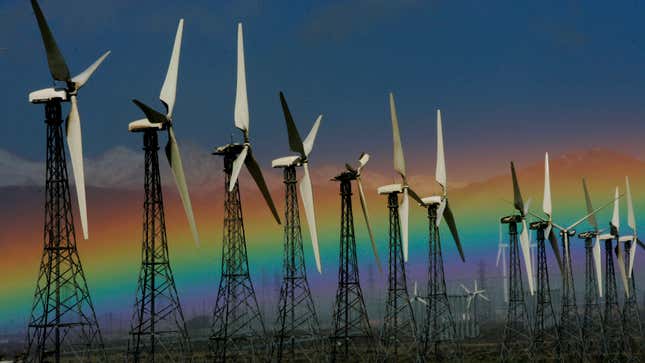
Right now, it seems like everything is fucked.
A global pandemic is spinning out of control—350,000 people have tested positive for covid-19, nearly 42,000 of whom are in the U.S. We’re facing an impending economic recession. Fifteen percent of American workers have already lost their jobs or hours due to the pandemic, and according to one prediction, three million people could become unemployed by summer. National inequality, which is already reaching record highs, could become far more dramatic.
And then, of course, there’s the climate crisis. Layering a pandemic on top of that makes a bad situation worse. Despite this, officials on Capitol Hill are considering bailing out failing fossil fuel industries as part of a covid-19 economic stimulus package. But over 100 climate and social policy experts have laid out a vision for a very different relief package. In a long letter posted on Sunday, they call for a stimulus that could prevent the spread of covid-19 in the short term while lowering inequality and carbon emissions and boosting employment and social welfare in the long term.
“We must focus on halting the spread of deadly illness,” the letter says. “However, we can do all the preparatory work now to make green projects ‘shovel ready’ as soon as it is healthy to commence the work.”
The authors propose a stimulus package of $2 trillion, which is similar in size to Capitol Hill Republicans’ proposal that the Senate shot down on Sunday. The similarities end there, though. While the Republican proposal would give less money to poorer households, the green stimulus proposal focuses on investment in communities hit hardest by the climate crisis, which are often poor and of color. And while the Republicans aimed to funnel $500 billion into private corporations selected by the Treasury Department without much oversight, the Green Stimulus aims to expand the public sector and cooperative ownership.
Many ideas were drafted by advisors to Democratic presidential primary campaigns, including those of Senators Bernie Sanders and Elizabeth Warren and Washington Governor Jay Inslee. The sweeping set of proposals includes policy proposals to reshape nearly every carbon-heavy sector of the American economy (which is basically everything). Plans for the immediate future are presented alongside ones that can be enacted once it’s safe to perform in-person work again.
“The coronavirus needs to be the priority right now, [but we must be] building towards an equitable and just stimulus package,” Daniel Kammen, an energy researcher at the University of California, Berkeley and former science envoy at the State Department, said on a press call.
Calls for nationwide moratoria on utility and water shutoffs and rent and mortgage freezes, for instance, sit alongside proposals to retrofit energy inefficient buildings and invest billions to expand low-carbon public housing. Crucially, the proposed stimulus package would be automatically renewed every year at 4 percent of GDP, which is about $850 billion dollars annually, until the U.S. has fully phased out the use of fossil fuels and succeeded in keeping the unemployment rate below 3.5 percent.
“This automatic renewing aspect is really important because Congress really only gets one shot at passing a large scale stimulus,” Mark Paul, an economist at the New College of Florida and senior fellow at Data for Progress, told reporters. “What we don’t want to happen is have them pass an initial stimulus, and then observe a lackluster recovery.”
On the Senate floor on Monday morning, Senate Majority Mitch McConnell accused Democrats of derailing stimulus package negotiations by attempting to include climate regulations, such as tax deductions for renewable energy and more stringent greenhouse gas emission standards for airlines.
“Are you kidding me? This is the moment to debate new regulations that have nothing whatsoever to do with this crisis?” he asked.
But of course, the current pandemic and environmental and economic injustice have cascading effects. Those living in more polluted areas are more vulnerable to covid-19. So are poorer families with limited access to water. And a Green New Deal style stimulus package, the authors argue, could help build a society that’s more resilient in the face of all kinds of global crises.
“The same communities and populations that we’re seeing are extremely vulnerable in a public health crisis are those same communities and populations that the Green New Deal centers,” Thea Riofrancos, assistant professor of political science at the University of Pennsylvania and senior fellow at Data for Progress, told reporters.
Without a stimulus package focused on climate and justice, “we’re just going to see the layering of crisis over prices for the years to come, whether it’s public health, economic recession, or extreme weather,” she said.